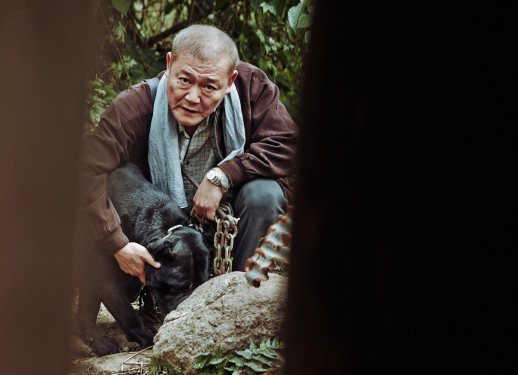We had to journey out to Pasadena to see this Korean horror flick which has a 100% critical rating on RT and an audience score in the mid-80s, both of which are borderline astonishing for a horror film. And this is a remarkable film in a lot of ways, even though certain aspects of the film are lost to those of us not steeped in Korean culture. (There are clues about what’s going on, for example, to be found in the characters’ underwear, which were naturally missed by The Boy and myself.)

Beware the Wedgie of the Undead!
Beyond cultural details, the film’s tone is extraordinary. It starts out with Our Hero, a lazy, incompetent cop, being a (peripheral) part of a horrible crime scene investigation. Peripheral, because he’s just not well-respected, and this seems deserved. He’s even kind of comical, and the movie has that tone of near whimsy which you can see in other “serious” Korean horror/thriller films, like The Host. But as we learn more, the nature of the crime is anything but whimsical: People are getting sick with this mysterious disease, one-by-one, throughout the village, and then hacking their families to death.
People suspect the new neighbor, a Japanese immigrant, in the sort of casual racism we can’t do in this country any more. I mean, it’s pretty much “He’s Japanese. He’s obviously the Devil.” To the point where they’re going to kill him for it. It’s a mistake to view this as one would an American film—like, the film makers are going to lecture us on the evils of racism. The big question actually becomes is he or isn’t he the Devil?
And who is the mysterious woman who shows up throwing rocks at the cops and intoning cryptic clues about the case? Maybe she’s the Devil, even if not Japanese.

“Let she who is without–OW! Hey, cut it out!”
When the hero’s own daughter becomes infected, and possessed, the tone has completely shifted to serious. An exorcist is called in, and an exorcism performed. The fascinating thing to me was that I knew exactly what a Korean exorcism entails (basically making a lot of noise to irritate the evil spirit into leaving), which was weird. (I think I saw a TV segment years ago on Korean exorcisms, and they’re really memorable.) Anyway, decisions—and mistakes—are made, and the whole thing comes down to a question of religious faith.
This is, in itself, kind of funny, because the hero himself doesn’t see it as a religious test. He sees everything in terms of saving his daughter.

Korean exorcism/BBQ.
Gripping, suspenseful, amusing (at first), and ultimately satisfying in a way horror movies usually aren’t, it’s hands down the best horror movie this year, and probably in a few years. We actually talked about it a lot on the (long) road home, trying to figure out The Big Picture. The protagonist’s weakness and incompetence early on made his subsequent breakdowns, when his daughter was sick/possessed, a lot more natural feeling. No laconic tough guy, here, so he could have a more range as a character than the typical horror hero. I mean, this is the general difficulty of horror: If you have a competent hero, the movie turns from horror into action or thriller. Helplessness is a key element of the genre. But utter helplessness is just boring.
So, this movie does an excellent job there. Another way it excels is in weaving the metaphorical with the literal without hitting you over the head with it. The mysterious woman is allegorical, but her role is not obvious. Although the photography is restrained, there are quite a few excellent shots and some great blocking. Even the title itself is a hint, though it doesn’t cross language barriers.
If you’re in the market for a Korean horror flick, you’ll be hard-pressed to do better.

Just because he’s Japanese doesn’t mean he’s—OH MY GOD! THE DEVIL!

3 thoughts on “The Wailing”